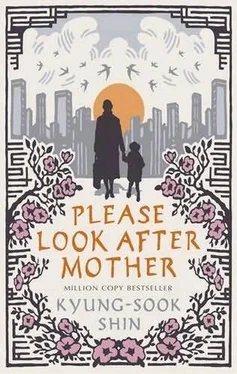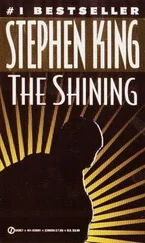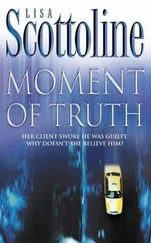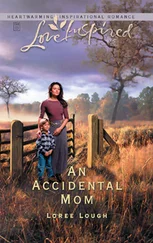Mom placed the steamed octopus on the chopping block and tried to slice it. But the knife kept slipping, just as it had when she was slicing the radish. “I’ll do it, Mom.” You took her knife again, sliced the hot radish-scented octopus, dipped a piece in red-pepper-and-vinegar sauce, and held it out to Mom. This was what she’d always done for you. Each time, you’d tried to pick it up in the air with your own chopsticks, but Mom would say, “If you eat it with your chopsticks, it doesn’t taste as good. Just open your mouth.” Now Mom tried to lift it in the air with her own chopsticks, and you said, “If you do that it won’t taste as good, just open your mouth.” You pushed the piece of octopus into her mouth. You tried one, too. The octopus was warm and squishy and soft. You wondered, Octopus for breakfast? But you and Mom ate it with your fingers, standing in the kitchen. As you chewed on the octopus, you watched Mom’s hand as she tried to pick up a piece and dropped it. You put a piece in her mouth for her. Soon she gave up trying to eat the octopus herself and waited for you to plop it in her mouth. Her hand seemed unfocused. Eating the octopus, you said, “Mother.” It was the first time you had called her “Mother.” “Mother, let’s go to Seoul today.” Your mom replied, “Let’s go up into the mountains.”
“The mountains?”
“Yeah, the mountains.”
“Is there a hiking trail from here?”
“I’ve made one myself.”
“Let’s go to Seoul and go to the hospital there.”
“Later.”
“Later when?”
“When your niece’s entrance exam is over.” She was referring to Hyong-chol’s daughter.
“You can go to the hospital with me instead of with Hyong-chol.”
“I’m fine. It’ll be fine. I’m going to the doctor of Chinese medicine for it. I’m getting physical therapy, too, because they said something’s wrong with my neck.”
You couldn’t persuade Mom-she kept insisting that she would go later. Then she asked you what the world’s smallest country was.
The smallest country? You stared at Mom, a stranger asking you a random question: What is the smallest country in the world? Mom asked you to get rose rosary beads for her if you ever went to that country.
“Rose rosary beads?”
“Prayer beads made of rosewood.” She looked at you listlessly.
“Do you need prayer beads?”
“No, I just want prayer beads from that country.” Mom stopped and let out a deep sigh. “If you ever go there, get me a set.”
You were quiet.
“Because you can go anywhere.”
Your conversation with Mom stopped there. She didn’t say another word in the kitchen. After the breakfast of steamed octopus, you and your mom left the house. You went across a few paddies in the mountains that rimmed the back of the village and stepped onto a trail in the hills. Even though it wasn’t a path people used, the trail was clear. The thick layers of oak leaves on the ground cushioned your feet. Sometimes the branches that reached into the trail hit your face. Mom, who was ahead of you, pushed the branches back for you. She let go of them after you walked through. A bird flew away.
“Do you come here often?”
“Yes.”
“With who?”
“Nobody. There’s nobody who would come with me.”
Mom walked this path by herself? You really couldn’t say you knew Mom. It was a dark path for anyone to walk alone. At some parts, the bamboos were so dense that you couldn’t see the sky.
“Why do you walk here by yourself?”
“I came here once after your aunt died, and I kept coming back.”
After a while, Mom stopped on top of a hill. When you came up next to her and looked where she was looking, you shouted, “Oh, this path!” It was a path you had completely forgotten about, the shortcut to your mom’s mother’s house, which you used to take when you were young. Even after they built the big road that passed through the village, people often used this mountain trail. It was the path you had taken one day when your grandmother was busy preparing for her ancestral rites, a live chicken trailing behind you on a rope. You had dropped the rope and lost the chicken. Though you had looked for it everywhere, you weren’t able to find it. Where had that chicken gone? Had the trail changed so much? You used to be able to walk this path with your eyes closed, but now, if it weren’t for the hill, you wouldn’t have known it was the same path. Mom stood there, staring at the place where her mother’s house once stood. Nobody lived there anymore. The people from that village, which once must have numbered fifty households, had all moved away. A few empty houses hadn’t been torn down, but it was a village that people had stopped coming to. So Mom had come here by herself to look down at the empty village she was born in? You wrapped your arm around her waist, and suggested again that she come to Seoul with you. Mom didn’t reply, and instead brought up the dog. You had been curious when you first noticed that the dog wasn’t in the doghouse, but you hadn’t had a chance to ask.
A year before, when you’d gone home in the summer, there was a Chindo tied next to the shed. It was sweltering, and the chain was so short that it seemed the panting dog, unable to get out of the sun, would fall over dead at any moment. You told Mom to untie the dog. Mom said that if she did people would be too scared to walk by. How could she chain a dog up like that, especially in the countryside… Because of the dog, you argued with Mom as soon as you arrived, not even bothering to say hello. “Why do you keep the dog tied up? Let it roam.” But Mom insisted, “Nobody, not even in the country, lets their dog run around. Everyone ties their dog on a chain-if you don’t, it’ll get lost.” You shot back, “Then you have to get a longer chain. If you tie it up with such a short chain, how is a dog supposed to survive in this heat? Do you treat it like that just because it can’t speak up for itself?” Mom said that was the only chain in the house; it was the one she had used for the previous dog. “Then you can go buy one!” Even though you’d come home for the first time in a long while, you drove back to town before setting foot in the house and brought back a chain so long that the dog could wander down the side yard. That’s when you realized the doghouse was small. You headed out again, saying you were going to get another doghouse. But Mom stopped you, insisting that there was a carpenter in a neighboring village whom she could ask to build her a new doghouse. Your mom couldn’t fathom paying for a house for an animal: “There are pieces of wood everywhere, and all you need to do is hammer it here and there, and you want to pay money for that? You must have money rotting in your pockets.” Later, when you left for the city, you gave her two ten-thousand-won checks and got her to promise that she would build the dog a big house. Mom promised she would. Back in Seoul, you called a few times to make sure that Mom had the doghouse built. Though she could have lied, each time she said, “I’m going to, I’ll do it soon.” The fourth time you called and heard the same answer, your anger overflowed.
“I gave you the money for it and everything. Country people are terrible. Don’t you feel bad for the dog? How is it supposed to live in that tiny space, especially in this heat? There’s feces inside, and the poor thing has stepped all over it, and you don’t even clean it up. How can such a big dog live in such a small contraption? Otherwise, let him roam free in the yard! Don’t you feel bad for the dog?”
The phone went silent. You started to regret saying that country people were terrible.
Mom’s angry voice came shooting across the line. “You care only about the dog, and not your own mother? Do you think your mother is the kind of person who would abuse a dog? Don’t tell me what to do! I’m going to raise it my way!” Mom hung up first.
Читать дальше











